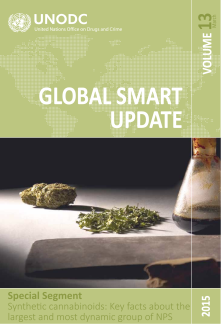UNODC (2014a), Global SMART Update

The rapid rise of synthetic drugs has become one of the world’s most pressing drug-related challenges. After cannabis, amphetamine-type stimulants (ATS) are the most widely used drugs globally, now surpassing cocaine and heroin. Alongside this, the market for new psychoactive substances (NPS) has expanded at an alarming pace, with reports of their presence in over 90 countries. These fast-changing trends make it difficult for governments to respond effectively, particularly as synthetic drugs continue to diversify and adapt.
To address this, the UNODC launched the Global SMART Programme in 2008, which helps countries strengthen their capacity to collect, analyse and share information on synthetic drugs. Through its updates, reports, and the SMART Early Warning Advisory, the programme provides vital data on seizures, manufacturing methods, trafficking routes, legislation, and the health risks posed by substances like synthetic cannabinoids. Published twice a year, the Global SMART Update ensures policymakers and experts have timely insights to respond to emerging drug threats and protect public health.